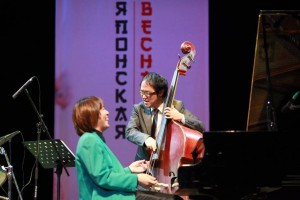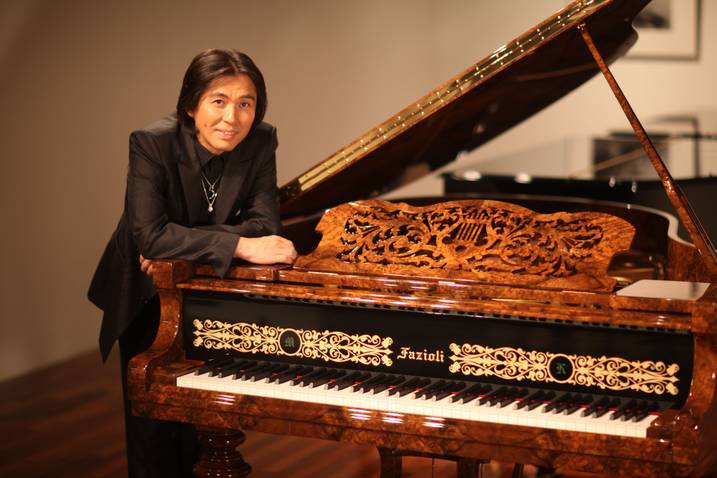Japanese jazz pianist Mitsuaki Kishi connects with worldwide audience
(Hal Foster appears in the Baltimore Post-Examiner under a partnership with Tengrinews of Kazakhstan. )
Japanese jazz piano player Mitsuaki Kishi gave such a mesmerizing performance at the 2004 International Jazz Festival in Vladivostok that fans in the Russian city began clamoring for his return.
They were so insistent that they kept up the drumbeat for six years until they finally got their wish in 2010.
The rollicking concert that Kishi-san performed at the Astana Opera and Ballet Theater recently showed that his ability in Vladivostok to connect with jazz fans from the former Soviet Union was no fluke.
His Astana fans filled every seat on the main floor and balcony of the theater and stood the entire length of both aisles on the theater’s wings.
In every number they lavished applause on Kishi, bass player Yuhei Honkawa and drummer Makoto Rikitake. Fans became particularly frisky during the piano, bass and drum solos, howling with appreciation and yelling “Bravo!”
The Mitsuaki Kishi Trio fed off the enthusiasm, becoming more animated as the concert progressed.
At one point a clearly surprised Kishi told the crowd through an interpreter: “What great jazz fans you are!” The crowd roared its approval.
Kishi laid the foundation for a special connection with the fans early in the performance by saying in Russian that he liked Astana and also telling the audience: “Ya tebya lyublyu!” (I love you!)
The trio’s first number was an up-tempo version of “You Are My Sunshine,” a song I’ve never liked because it’s always seemed mournful. Not in Kishi’s masterful hands. Not only was the trio’s version sprightly, but Kishi threw in boogie-woogie elements that made it even more fun.
The next song was the Disney standard “When You Wish Upon a Star.” I had never heard anything but slow, soft versions of this piece. Kishi turned it into a frolicksome, toe-tapping affair.
Next came the romantic old jazz tune “’S Wonderful.” The trio fashioned it into a lively number, too.
The phrase “unique style” is over-used in the music business, but it certainly applies to Kishi. It’s hard to describe his style, but the words “vibrant,” “joyful” and “spirited” would be part of the mix.
You can hear some of his music here.
Kishi’s fingers flew across the keyboard on so many numbers in Astana that he reminded me of a classical pianist – though what he produced was all jazz, nothing like classical.
Japanese jazz fans, the most fervent in the world these days, certainly appreciate his style. Those who read “Swing,” Japan’s oldest and most famous jazz magazine, have continuously ranked him one of the most popular jazz pianists in the country.
And the knowledgeable writers and editors at “Swing” have bestowed the journal’s coveted Gold Disc award on three of his albums.
Although he’s a jazz institution in Japan, Kishi has followers in the United States and Europe. In the past decade, he’s extended his reach to much of the former Soviet Union.
Kishi-san has toured in Japan with several American jazz legends, including singers Ernestine Anderson and Grady Tate, who also is a drummer; sax players Harry Allen, James Moody and Scott Hamilton; guitarists Howard Alden and Bucky Pizzarelli; bass player John Clayton; cornet player Warren Vache; and drummer Jeff Hamilton.
Kishi’s trio played in the famed Concord Jazz Festival in California in 1999. That program included jazz icons such as Rosemary Clooney, the Count Basie Orchestra and Manhattan Transfer.
Kishi began performing in the former Soviet Union in 2003, touring six cities in Russia.

He followed his first Vladivostok jazz festival appearance in 2004 with an appearance at the Far East Jazz Festival in Khabarovsk in 2006.
The maestro performed in Dusseldorf, Germany, in 2008, before making his first stop in Central Asia – in 2011 in Bishkek, Kyrgyzstan, where he played a second time in January of this year.
In addition to Kishi’s musical mastery, Astana fans loved his alluring smile. He flashed it often – at the audience and at his band-mates. It made the fans like him that much more.
The Japanese Embassy in Astana was one of the sponsors of Kishi’s concert, along with Japan Tobacco International, so a Japanese piece was in order. The Mitsuaki Kishi Trio served up a festive version of the traditional song “Sunayama,” or “Dunes.”
For me, the most interesting part of the tune was Honkawa using a large bow to play his bass as if he were playing a violin. I have rarely seen a bass bow used in any kind of concert. It worked in this instance because it produced a sound that captured the feeling of tradition Japanese.
Immediately after “Sunayama” came a snappy rendition of the traditional Russian song “Otchi Tchorniya,” or “Dark Eyes.” As soon as fans heard the first few bars, they realized that Kishi had prepared it especially for them and began applauding.
Rikitake revved up the audience with a long drum solo during the number, his closed eyes showing how much he was feeling the piece.
The crowd began bouncing when the trio jumped into one of the world’s most recognizable jazz songs, “Take the A Train.”
It was a piece guaranteed to display Kishi’s piano skills – and he didn’t disappoint. He pounded the keyboards, flashed his fingers across them and added boogie woogie, too.
The crowd loved his artistry, as they did Honkawa’s bass solo. The bassist showed how much he was in to the song by opening his mouth and humming like he was scatting.
The next tune, the pulsating “Caravan,” began with a long drum solo from Rikitake that further energized the already fired-up audience.
Fans love “Caravan,” but its frenetic fast pace means it can be daunting for a pianist. Maestro Kishi didn’t miss a beat – and fans recognized it, clapping and yelling.
The audience called the trio back for one more number before letting them leave the stage for good.
Before I strolled out of the concert hall, I noticed the pleased looks on the faces of the trio as journalists lingered to interview and shoot video of them.
I thought to myself: “I’ll bet Astana will see Kishi-san again.”
A couple of weeks later, I did what I could to increase the chance that it will happen.
When I bumped into Japanese Ambassador Yuzo Harada at the Astana Economic Forum, I told him how much Astana fans had liked Kishi-san. And I told him I was doing a review of the concert.
The ambassador, who had watched the concert from a V.I.P. seat, smiled with satisfaction.
I didn’t beseech Harada-san directly to bring the maestro back, but I know he got the message.

Hal Foster is a longtime journalist and journalism professor who has worked in the United States, Japan, Ukraine and Kazakhstan. His news career has included writing and editing at the Los Angeles Times and nine years as a journalist in Japan. He is an associate professor of Communication at the new Nazarbayev University in Astana, Kazakhstan. Catch one of his other blogs at en.tengrinews.kz.

